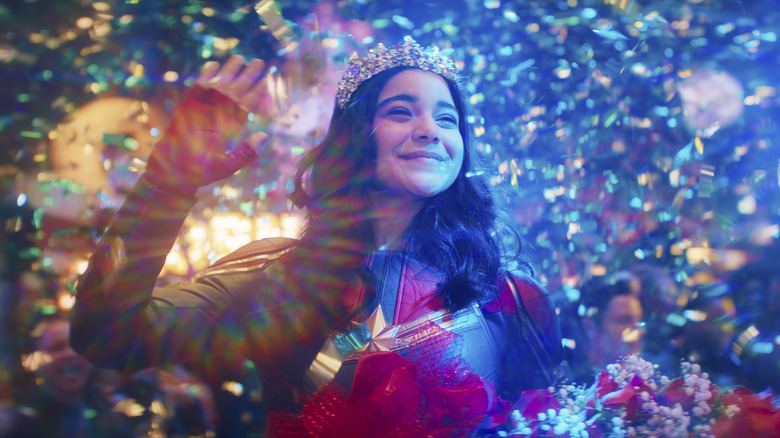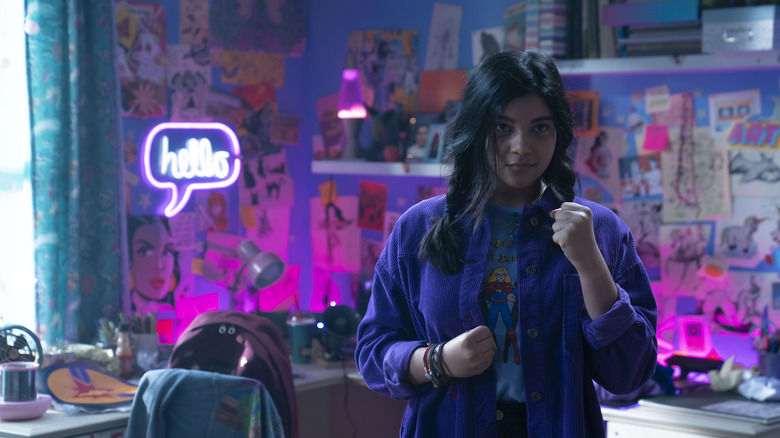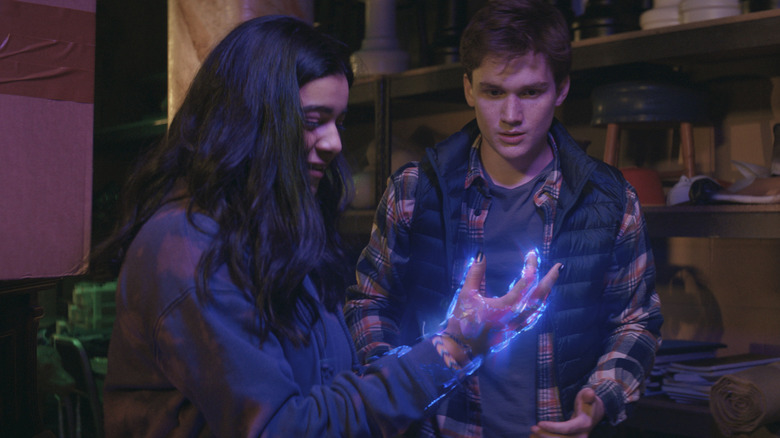Ms. Marvel Review: A Breathlessly Imaginative Teen Comedy, And Breath Of Fresh Of Air For Superhero Shows
When Peter Parker first swung onto the pages of Marvel Comics in 1962, he changed the world. For the first time, here was a relatable, flawed superhero for the teens — a stark difference from all the aspirational heroes who came before him. But as Spider-Man exploded in popularity, he lost some of his outcast relatability — though the comics would constantly try to recapture it with multiple amnesiac episodes and alternate universe reboots. Enter: Kamala Khan.
Making her debut on the pages of "Captain Marvel" before getting her solo series soon after in 2014, Kamala Khan's Ms. Marvel was the source of much hoopla: for being the first Muslim superhero to headline her own series, and for being Marvel's hamfisted way of trying to make the "Inhumans" retconning stick (the less said about that, the better). But underneath all the annoying chatter about identity politics and comic book lore, there was a wonderful story about an insecure teenage superhero that managed to recapture what made Spider-Man so magical.
Kamala Khan was silly, shortsighted, overeager, and a fangirl totally out of her depth. And as depicted by writer G. Willow Wilson and artist Adrian Alphona, she was utterly charming. The combination of her relatable teen life — schoolwork, school crushes, parties — and her rich home life courtesy of her Muslim upbringing made the "Ms. Marvel" comics feel like a breath of fresh air.
The "Ms. Marvel" TV series translates all that to the screen — and more. The delightful new Disney+ series, created by Bisha K. Ali and directed by "Bad Boys for Life" duo Adil El Arbi and Bilall Fallah, is more than just a Spider-Man redux. "Ms. Marvel" is a shot of candy-colored joy, a fantastic coming-of-age comedy that happens to moonlight as a superhero show.
Like an idea come to life
Newcomer Iman Vellani delivers a star-making turn as Kamala Khan, an average 16-year-old who loves the Avengers. But not just any Avenger: she is a total fangirl for Carol Danvers, aka Captain Marvel.
In a sequence that takes a few cues from the opening scenes of the groundbreaking "Spider-Man: Into the Spider-Verse" and "Mitchells vs. the Machines" (both of which were shot-to-the-arms to the animation medium), Kamala recounts the Avengers' awesome battle against Thanos, her doodles springing to life and dancing off the page to re-enact the fight, as she gushes about how the only hero to stand above the rest was Carol Danvers. Crayon drawings explode and transform into Captain Marvel or the Hulk in the blink of an eye, crinkled lined notebook paper becomes the war-torn backdrop of New York, all while Vellani joyfully narrates what turns into a YouTube video with hundreds of views and dozens of equally gushing comments. Already Kamala leads a double life — though one that exists only online.
This fizzy opening sequence sets the stage for the visually imaginative palette that directors El Arbi and Fallah would maintain for the first two episodes made available to critics. The show is jam-packed with stylistic flourishes — split screens, camera whips and zooms, doodles that wink and blow kisses at the screen, murals that come to life as Kamala and her best friend Bruno (a sweetly endearing Matt Lintz) blow through town on their bikes, their thoughts and conversations playing out in the backgrounds behind them. It's a visual language that feels tailor-made for Gen Z audiences who live and breathe fast cuts and frenetic edits. And it's one that makes sense for Kamala Khan, who spends most of her time with her head in the clouds, frequently imagining a much more exciting life than the dull one she lives as a weird loser at a Jersey City high school.
That all changes when Kamala sneaks out of her house one day to attend the first annual Avengers Con, bringing along with her a homemade Captain Marvel costume and a mysterious bangle that she unearthed from among her grandmother's box of family trinkets. While onstage at the con's Captain Marvel costume contest, Kamala puts on the bangle, and immediately feels a strange sensation that appears to send her briefly careening through some cosmic realm. She snaps back to reality and a beam of light shoots out of her hand and hardens: she has superpowers.
A breath of fresh air
As breathlessly imaginative as the visuals of "Ms. Marvel" visuals are, the great appeal of the series isn't in the stylistic flourishes or even in the gleeful sincerity with which the show treats its superhero origin story, but in its delightful coming-of-age story.
"Ms. Marvel" is a teen comedy series first and foremost, Ali bringing with her some of the charm, wit, and understanding of teen angst she showed in her contributions to Netflix's "Sex Education" (albeit without any of the raunchier elements). It's nothing groundbreaking, but the show's low-key stakes, anchored in teen drama and cultural authenticity, nonetheless make "Ms. Marvel" stand out from the other Marvel Disney+ shows.
Kamala's awkward training scenes with her friend Bruno (the only one who knows about her powers) sit comfortably alongside subplots about Kamala crushing on the hot new guy at school, or Kamala's friend Nakia's (Yasmeen Fletcher) campaign to improve conditions at the mosque for women. Interwoven throughout is an ongoing mystery about Kamala's ancestry, stretching back to the Partition of India and Pakistan (a subject that is only recently getting more coverage in movies and TV).
As a high school comedy, "Ms. Marvel" is nothing new. As a superhero origin story with a relatable teen protagonist, "Ms. Marvel" is nothing new. But the particular alchemy of elements that make up "Ms. Marvel" — Kamala's Peter Parker-like relatability, her authentic cultural background, El Arbi and Fallah's vibrant directorial style, and the frankly adorable teen escapades — make "Ms. Marvel" feel like something truly special.
"Ms. Marvel" launches on Disney+ on June 8, 2022.


